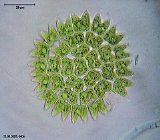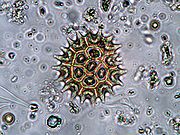
Pediastrum
Encyclopedia

Algae
Algae are a large and diverse group of simple, typically autotrophic organisms, ranging from unicellular to multicellular forms, such as the giant kelps that grow to 65 meters in length. They are photosynthetic like plants, and "simple" because their tissues are not organized into the many...
, in the family Hydrodictyaceae
Hydrodictyaceae
Hydrodictyaceae is a family of algae, in the order Chlorococcales.-Scientific databases:* * *...
. It is a nonmotile coenobial
Coenobium
A coenobium is a colony containing a fixed number of cells, with little or no specialization. They occur in several groups of algae. The cells are often embedded in a mucilaginous matrix and may be motile or non-motile....
(fixed number of cells) green alga that inhabits freshwater environments.
Reproduction
Pediastrum reproduces asexually by producing autocolonies. The protoplast of each parent cell gives rise to a biflagellate zoospore for each cell in the parent colony. The zoospores are freed from the parent cell within a vesicle and then arrange themselves into the cellular arrangement for that particular species. The cells then enlarge until they reach full size. Each cell can generate a daughter autocolony with exactly the same number and arrangement of cells as the parent colony.Pediastrum reproduces sexually via the fusion of small, biflagellate gametes that are released from the parent cell. The zygotes germinate into zoospores, which turn into thick-walled polyeders that generate the new coenobia. These polyeders can also result from asexual reproduction.

